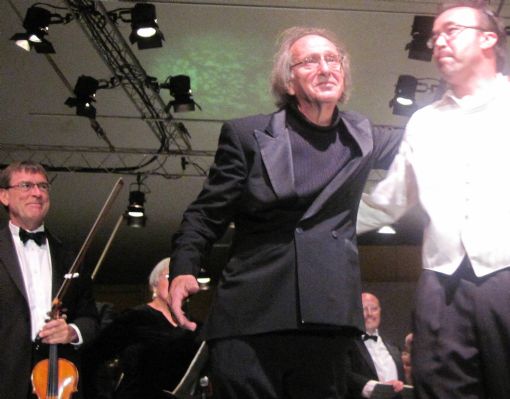|
Symphony
FROM THE NEW WORLD TO THE OLD WORLD
by Peter Lert
Saturday, June 14, 2025
Chamber
MC2 DUO RECITAL CLOSES 222'S SEASON
by Terry McNeill
Saturday, June 14, 2025
Choral and Vocal
CANTIAMO SONOMA'S LUSCIOUS A CAPELLA SINGING IN SEASON ENDING CONCERT
by Pamela Hicks Gailey
Sunday, June 8, 2025
Symphony
SRS SEASON ENDS WITH RESOUNDING TA-TA-TA-BANG
by Terry McNeill
Sunday, June 1, 2025
Symphony
YOUTHFUL VIRTUOSITY ON DISPLAY AT USO'S MAY CONCERTS
by Peter Lert
Saturday, May 17, 2025
Symphony
MYSTICAL PLANETS AND LIVELY GERSHWIN ORTIZ AT FINAL SRS CONCERT
by Peter Lert
Sunday, May 4, 2025
Symphony
VSO'S CONCERT MUSIC OF TIME, MUSIC OF PLACE
by Peter Lert
Sunday, April 27, 2025
VOCAL ELEGANCE AND FIRE AT THE 222'S RECITAL APRIL 26
by Pamela Hicks Gailey
Saturday, April 26, 2025
CANTIAMO SONOMA SINGS AN INSPIRED GOOD FRIDAY MOZART REQUIEM CONCERT
by Pamela Hicks Gailey
Friday, April 18, 2025
DRAMATIC SHOSTAKOVICH SYMPHONY CLOSES PHILHARMONIC'S 25TH SEASON
by Terry McNeill
Sunday, April 13, 2025
|
 |
 Concertmaster Roy Malan (l) with Alan Pollack and James D'León July 13 |
MUSCULAR MUSIC OPENS MENDO FESTIVAL
by Terry McNeill
Saturday, July 13, 2013
Programming the opening concert for the 27th Mendocino Music Festival is not a daunting task, but it’s one that should play to the strengths of the orchestra and the audience. No Schnittke or Elliott Carter in the mix. Conductor Alan Pollack deftly chose rousing and accessible works for the July 13 event before a boisterous full house in the massive white tent on the coast bluff.
Verdi’s overture to the opera “I Vespri Siciliani” launched the 23-concert Festival in a pungent performance that Mr. Pollack crafted with large sonic contrasts and an emphasis on the Italian flavor of the piece. From my stage right seat the brass and low strings dominated the violins and winds, and the conductor pushed the tempos and momentum to an exciting conclusion. There was only a nod here and there to phrase ritards and soft passages, and the large 70-person orchestra responded adroitly to Mr. Pollack’s animated baton and desire for a big sound.
Sonic splendor had continued emphasis with Prokofiev’s First Suite, Op. 64bis, from the mid 1930s ballet Romero and Juliet. In seven parts, the Suite is pure program music and audience appreciation could have been enhanced by a printed description of each section (the program incorrectly listed another Prokofiev ballet Suite). The symphonic balance was improved by a seat change to the middle of row three, and now the strings could not only be seen but heard. However there was little change from the Verdi in Mr. Pollack’s conception of the evocative Prokofiev score. It was a big-boned reading throughout, beginning with a dreamy and loud “Folk Ball” and ending with a sultry and sarcastic dance swelling to a romantic swirl in “Death of Tybalt.”
Along the way were lovely instrumental moments: clarinetist Arthur Austin and Carolyn Lockhart’s (bassoon) solos in ”Street Awakens”; flutist Mindy Rosenfeld and piccolo player Kathleen Reynolds in the “Minuet”; brass fanfares in “Masks” and always the conductor’s careful control of the big climaxes and contrasts. Principal trumpet Scott Macomber received a solo bow request from Mr. Pollack and a rousing ovation from 750 in attendance.
Following intermission the Rachmaninoff C Minor Piano Concerto, Op. 18, should have been the concert’s capstone, but curiously received a performance where the whole wasn’t the sum of the component parts. Pianist James D’León elected a mostly non-legato approach to the soaring solo line, perhaps necessitated by an overly bright and thin top end in the piano and Mr. Pollack’s interest in weighty sonority over tender pianissimo.
In the opening Moderato the tempos were judicious and playing effective, but the orchestra often covered the piano part, including the coda and the final three chords. In the lovely Adagio Sostenuto Mr. D’León produced a more warn tone, especially in the duos with the clarinet, and highlighted several inner voices in descending figures. Oddly a few notes were smudged in this most popular music, and he used a score resting on the tuning pins.
Balances in the concluding Allegro Scherzando were the best of the night and Mr. D’León’s trills were even and the contrapuntal lines clear. The playing from the Orchestra’s violin sections was lush and only occasionally did they wrest the poetic melodic line from the pianist. Acoustics in this wide tent favor the Orchestra over the pianist, not a surprise given Mr. Pollack’s vociferous demands and his muscular view of the celebrated score.
Strange for an initial Festival concert was the lack of any welcoming remarks by management, talk from the conductor or even a warning to silence cell phones. Mr. Pollack clearly knows what he wants and can bend an artistic unity to his wishes.
Wotan Rock contributed to this review.
|

